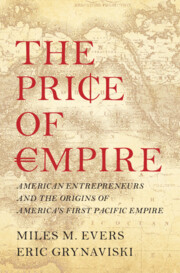Conclusion
Published online by Cambridge University Press: 28 March 2024
Summary
Why did the United States establish an early American Empire in the Pacific (1856-1898)? This chapter summarizes the argument of this book, explaining why patterns of imperialism demonstrate the influence of commodity prices and entrepreneurs for distinctive patterns of American imperialism. It then addresses 1898. Scholars often suggest that 1898 was the moment when the United States became an empire. This chapter argues that this view is misplaced. Instead, 1898 marks a shift in the US approach to empire, when the US Navy replaced the small entrepreneur as the key figure in US expansion. It then addresses the lessons learned from this book, with an emphasis on the politics of race in the contemporary Pacific and struggles for recognition in the region.
Keywords
- Type
- Chapter
- Information
- The Price of EmpireAmerican Entrepreneurs and the Origins of America's First Pacific Empire, pp. 151 - 166Publisher: Cambridge University PressPrint publication year: 2024



